Margaret Thatcher: The Iron Lady
 Gary Gibbon
Political Editor
Gary Gibbon
Political Editor
Margaret Thatcher was Britain’s first woman prime minister. And, as Gary Gibbon writes, at her death the Iron Lady leaves behind a country very different from the one she once led.
Born Margaret Roberts, the daughter of a Grantham corner shop owner, she would come to dominate the British political scene like few in history.
But Margaret Thatcher arrived in a Westminster that was still an all-male club. To her contemporaries the idea of a young mother embarking on a full-time political career was baffling.
She told reporters at the time: “There are the parliamentary recesses which coincide with the school holidays so I can see quite a bit of the children.”
I don’t think there’ll be a woman prime minister in my lifetime. Margaret Thatcher, 1972.
Mrs Thatcher broke every Tory convention: a woman, a chemistry graduate, a grammar school girl.
“It will be years before a woman either leads the Conservative Party or becomes Prime Minister,” she said in 1972. “I don’t think there’ll be a woman prime minister in my lifetime.”
Yet Tory MPs elected her as their leader in 1975 . When she seized the dagger and challenged Edward Heath, she was acutely aware that many of her colleagues looked down their noses at her.
Mrs Thatcher said: “In the eyes of the ‘wet’ Tory establishment I was not only a woman, but ‘that’ woman … someone not just of a different sex but of a different class… I offended on many counts.”
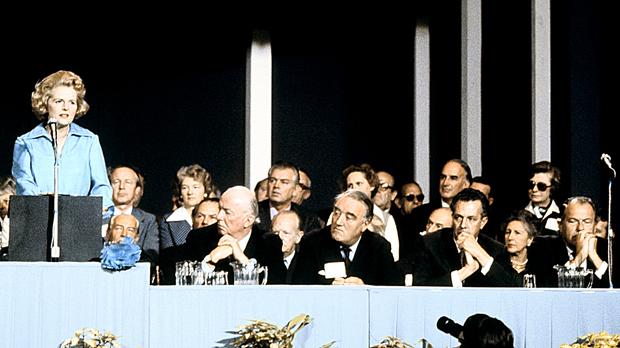
The outsider
In 1979, Margaret Thatcher achieved a landslide victory which laid the foundations for 18 years of Conservative government, but she was not yet supreme in her own party.
In her first cabinet, there were only a handful of true Thatcherites – who she put in the economic posts. Mrs Thatcher was seriously outnumbered by the “wets”, who would undermine her and who under-estimated her.
You turn if you want to. The Lady’s not for turning. Margaret Thatcher, 1980
One of the cabinet wets Jim Prior, now Lord Prior, said: “To start with there was an uneasy mix for her but I think that was good for the collective decisions of the Cabinet. She didn’t always get her own way and that probably was a good thing as well.”
But Margaret Thatcher did rewrite Conservative economic policy. She blasted the old Conservative establishment off the field – she thought they’d pursued a consensus with Labour’s disastrous economic policies. And – to her – consensus was a dirty word.
In a defiant speech to Conservatives at the party conference in Brighton in 1980, she famously said: “You turn if you want to. The Lady’s not for turning.”
Nigel Lawson, financial secretary to the Treasury at the time, said more recently: “You could talk to anybody really, the only thing they were asking was ‘Is the U-turn going to be in six months or will they last as long as 12 months before they have a U-turn ?’
“And they could not believe that we actually meant what we said – that we were actually going to go through with it. And it was really Margaret’s determination which was absolutely critical in that.”
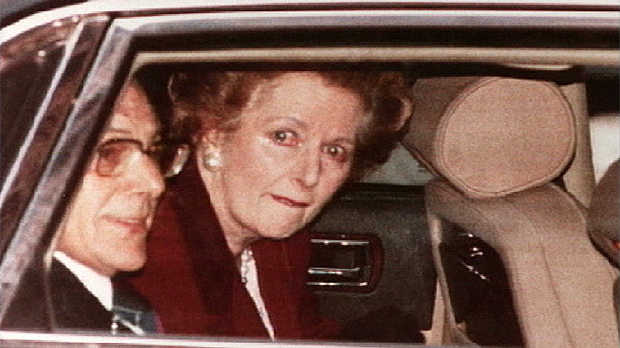
Woman on a mission
Margaret Thatcher and a clique of true believers were engaged in an economic mission.
The central creed was monetarism (controlling the printing of money to bear down on inflation) but the other articles of faith were tax cuts, squeezing the trade unions, later the sale of council houses and eventually – her proudest boast – privatisation.
I think we became a more divided society as a result of Margaret Thatcher’s time in office. Baron Prior
More than £29bn was raised by selling off nationalised industries, such as British Gas in 1986, and a further £18bn scooped up from the sale of council houses.
Lord Young, a cabinet minister during that period, said: “She and a group of us in that Government at that time gave the world privatisation and in a dozen years it swept the world.”
But at home, for millions of jobs in manufacturing and industry, the Thatcherite economic programme was fatal and employers joined trade unions pleading for reflation of the economy.
Margaret Thatcher said the riots in Brixton and Toxteth were nothing to to do with her monetarist experiment, but her critics believed that she was polarising Britain.
Baron Prior said: “I think we became a more divided society as a result of Margaret Thatcher’s time in office.”
Beyond economics, voters were getting to know their prime minister better through events and her reactions to them. At the opening of the M25 opening she said: “I must say I can’t stand those who carp and criticise.”
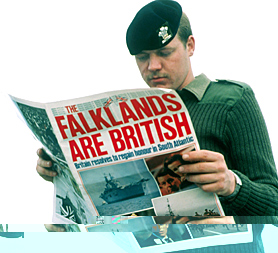
Warrior Queen
Margaret Thatcher personally authorised the SAS raid to free hostages from the Iranian embassy in London and she refused to concede political status to IRA hunger strikers at the Maze Prison.
“Crime is crime is crime. It is not political, it is crime,” she said in 1981.
Lord Young remarked: “She could sit back, and I know of no other political leader who would do the same, go through all the hunger strikers, and let them go and kill themselves, one after the other, and be resolute and unbowed.”
When the IRA leader in the Maze, Bobby Sands, died, the IRA made Margaret Thatcher their top target for assassination. And in 1984, at the Conservatives’ Brighton Conference, the IRA came close to killing Margaret Thatcher and her cabinet.
Yet she told reporters the conference would go on as usual. “All attempts to destroy democracy by terrorism will fail.”
But Margaret Thatcher believed it was another violent episode two years earlier that marked the turning point in her popularity.
Britain is not prepared to be pushed around. We have ceased to be a nation in retreat. Margaret Thatcher
Despatching a taskforce to re-take the Falkland Islands from Argentina was every inch a Thatcher initiative. Her own foreign secretary, along with much of the international community, tried to dissuade her – right up to the last minute.
Victory came at a cost of more than 250 British lives, and nearly 700 Argentines. But for Margaret Thatcher the Battle of The Falklands rekindled Britain’s past glories.
“It is very important that these wonderful Falkland Islands people should know that we are here to defend them,” she said.
Riding on the Falklands’ spirit, she said in one speech: “Britain is not prepared to be pushed around. We have ceased to be a nation in retreat.”
Lord Hattersley, Labour’s deputy leader 1983-92, said Margaret Thatcher had a “very, very sharp image”.
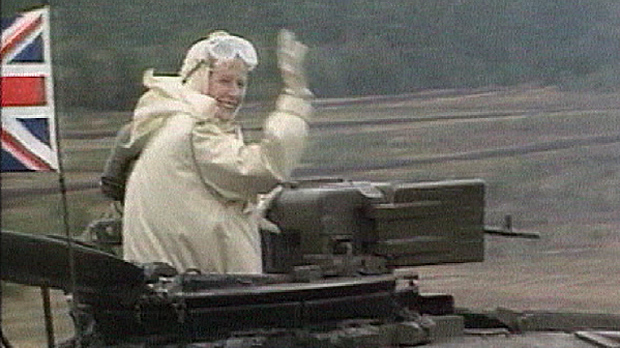
Lord Hattersley: “A sharp image of aggression, certainty, determination, ruthlessness, and sometimes brutality. She was the warrior queen not only about the Falklands – she was a warrior queen in whatever she did. If you were dealing with the trade unions… they were an enemy to be routed and no quarter.”
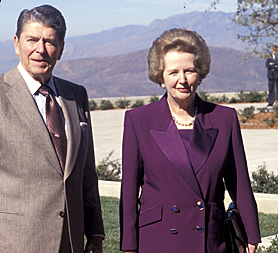
The enemy within
Margaret Thatcher cast the trade unions as the enemy within – she restricted picketing, introduced compulsory postal ballots and ended the closed shop.
But the climactic moment in her war with the unions came when the National Union of Mineworkers’ chief, Arthur Scargill, called his members out on strike in 1984.
Margaret Thatcher used every force available – and some which constitutionally weren’t strictly available – to make sure she defeated a union leader she saw as dangerously extremist.
At the same time, the international face of the Hard Left was softening. Margaret Thatcher spotted Mikhail Gorbachev’s willingness to reform before many others.
And she stuck by him when his position was shaky.With her political soulmate Ronald Reagan in the White House, for much of the 80s, she would claim co-authorship of death of communism.
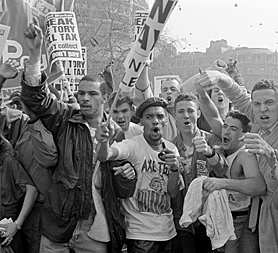
But at home there was a new uprising. Margaret Thatcher was warned that the poll tax – a one rate for all council tax – would be unpopular, but she steamed ahead.
“It was a one-off thing to which she’d become absolutely adamantly committed and would not hear any word against it. She wouldn’t have been like that during the early phase, the early Margaret Thatcher would not have made that mistake,” said Lord Lawson, who was Chancellor of the Exchequer from 1983-89.
Many were now muttering that Margaret Thatcher seemed to be losing touch with the real world. The economy was faltering and she was becoming a little imperial.
Yet as the 1990s were ushered in, it was European integration which would seal her fate; her approach could be summed up in one word: “No”.
No. No. No. Margaret Thatcher, the europhobe
Margaret Thatcher moved from being a practical European to a Europhobe. She argued it was Europe that had changed, not her – that President Mitterrand and Chancellor Kohl were old men in a hurry.
“We haven’t worked all these years to free Britain from the paralysis of socialism only to see it creep in through the back door of central control and bureaucracy from Brussels,” Mrs Thatcher said in Bruges.
Her aggressive tone on Europe alienated abroad and at home and old allies felt a bunker mentality was devoloping.
“Partly because of the illusion that she was totally self-sufficient, that she didn’t need anybody else, she became careless in terms of personal relationships,” Lord Lawson said.
Lord Butler, cabinet secretary from 1988-98, added: “She wasn’t prepared to brook argument and so in the latter part of Geoffrey Howe and Nigel Lawson’s time as Minsters she was barely on speaking terms with them.”
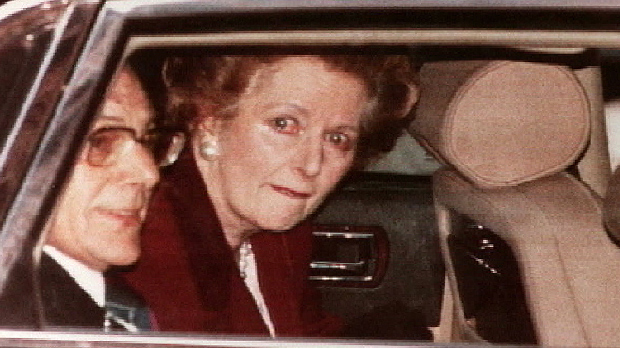
Eventually, the last survivor from her first Cabinet – Sir Geoffrey Howe – quit.
A cabinet minister from 1979 to 1990, Lord Howe later said: “She found my style of argument increasingly irritating – and to be honest I daresay I did hers as well.”
Announcing his resignation in the House of Commons in 1990, he said: “The time has come for others to consider their own response to the tragic conflict of loyalties with which I have myself wrestled with for perhaps too long.”
Mrs Thatcher described his resignation statement as an act of bile and treachery, designed to stir her hungriest enemy – Michael Heseltine.
He’d been five years in the backbench wilderness denying murderous intent. Mr Heseltine would repeatedly claim: “I would not challenge Mrs Thatcher in any circumstances.”
But now he was ready to strike. “I am persuaded that I now have better prospects than Mrs Thatcher of leading the Conservatives to a fourth election victory,” he said in 1990.
Margaret Thatcher felt it beneath her dignity to fight hard for her own job. She went off to a European summit in Paris, and in her absence an amateurish campaign was mounted.
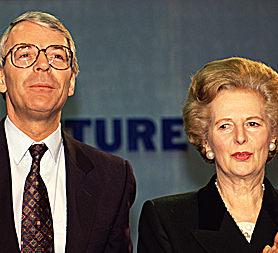
She thought she could plough on but she was mortally wounded.
One by one, her cabinet members told her the game was up. She resigned and was cheered by her treacherous party before one last hurrah in the Commons “I’m enjoying this,” she told MPs.
And then she was off.
Legacy years
She left a Conservative party deeply traumatised by its act of political matricide. But she also left a rare body of political achievement behind her. She was the longest-serving PM for more than 150 years and was the first woman ever to take the role.
The reason she is so important is because she did change the course of history. She changed history and the Labour party. Lord Hattersley
“The period when she was in office was a decisive, mood-changing, society-changing period and that is much to her credit,” said Lord Howe.
Lord Hattersley conceded: “The reason she is so important is because she did change the course of history. The way Attlee changed the course of history by making both major parties in favour of public ownership of the utilities, social service and health service.
“She changed the course of history perhaps more lastingly – by making both major parties in favour of the market economy, critical of the trade unions, worried about bureaucracy, determined to have a free enterprise system in the public service as well as in the private sector. She changed history and changed the Labour Party.”
Margaret Thatcher was convinced no-one could do the job as well as her and John Major’s Premiership did nothing to alter that view. William Hague was more to her taste.
Her comeback appearances had a habit of reviving Conservative divisons. And even in retirement, she was never far from controversy.
In 2003, she lost her husband, Denis – they’d been married for 52 years. It was said that Sir Denis was in “the Thatcher party not the Tory party”.
He once famously remarked, recalling the words of Mark Twain, that: “it’s better to keep my mouth shut and be thought a fool rather than open it and remove all doubt.”
When he died Margaret Thatcher said: “Being PM is a lonely job. In a sense, it ought to be – you cannot lead from a crowd. But with Denis there I was never alone. What a man. What a husband. What a friend.”
In retirement, she told friends her proudest achievement was moving the Labour Party onto her economic ground.
In later years, her health and powers of concentration declined, but in one of her rare public appearances – unveiling a statue of herself in the Commons (pictured) – she rejoiced in her cold war warrior reputation as the “Iron Lady”.
“I might’ve preferred iron – but bronze will do,” she said at the unveiling, to laughter and applause.
The Conservative outsider few thought would reach the top altered the course of British politics and became one of the most era-defining British prime ministers in history.
-
Latest news
-
‘I never read anything like that before’: Benedict Cumberbatch new Netflix series Eric4m

-
Thousands buried alive after Papua New Guinea landslide2m

-
Starmer on what he would say to Netanyahu – after Rafah attack7m

-
‘Really heartbreaking, really sickening’: UNRWA on Israeli attack on Rafah refugee camp4m

-
Netanyahu calls Rafah attack ‘tragic mistake’7m

-




